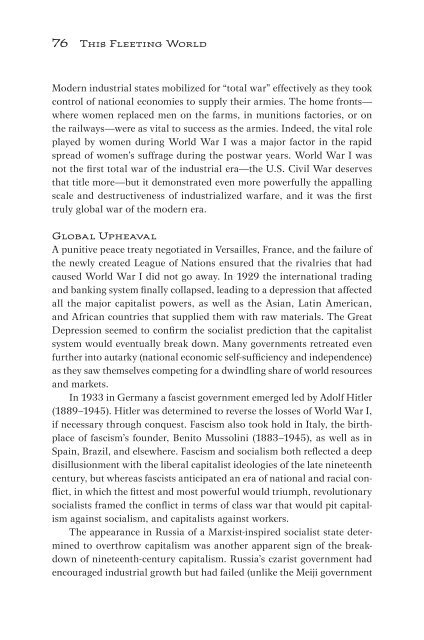This Fleeting World
This Fleeting World
This Fleeting World
Create successful ePaper yourself
Turn your PDF publications into a flip-book with our unique Google optimized e-Paper software.
76 <strong>This</strong> <strong>Fleeting</strong> <strong>World</strong><br />
Modern industrial states mobilized for “total war” effectively as they took<br />
control of national economies to supply their armies. The home fronts—<br />
where women replaced men on the farms, in munitions factories, or on<br />
the railways—were as vital to success as the armies. Indeed, the vital role<br />
played by women during <strong>World</strong> War I was a major factor in the rapid<br />
spread of women’s suffrage during the postwar years. <strong>World</strong> War I was<br />
not the first total war of the industrial era—the U.S. Civil War deserves<br />
that title more—but it demonstrated even more powerfully the appalling<br />
scale and destructiveness of industrialized warfare, and it was the first<br />
truly global war of the modern era.<br />
Global Upheaval<br />
A punitive peace treaty negotiated in Versailles, France, and the failure of<br />
the newly created League of Nations ensured that the rivalries that had<br />
caused <strong>World</strong> War I did not go away. In 1929 the international trading<br />
and banking system finally collapsed, leading to a depression that affected<br />
all the major capitalist powers, as well as the Asian, Latin American,<br />
and African countries that supplied them with raw materials. The Great<br />
Depression seemed to confirm the socialist prediction that the capitalist<br />
system would eventually break down. Many governments retreated even<br />
further into autarky (national economic self-sufficiency and independence)<br />
as they saw themselves competing for a dwindling share of world resources<br />
and markets.<br />
In 1933 in Germany a fascist government emerged led by Adolf Hitler<br />
(1889–1945). Hitler was determined to reverse the losses of <strong>World</strong> War I,<br />
if necessary through conquest. Fascism also took hold in Italy, the birthplace<br />
of fascism’s founder, Benito Mussolini (1883–1945), as well as in<br />
Spain, Brazil, and elsewhere. Fascism and socialism both reflected a deep<br />
disillusionment with the liberal capitalist ideologies of the late nineteenth<br />
century, but whereas fascists anticipated an era of national and racial conflict,<br />
in which the fittest and most powerful would triumph, revolutionary<br />
socialists framed the conflict in terms of class war that would pit capitalism<br />
against socialism, and capitalists against workers.<br />
The appearance in Russia of a Marxist-inspired socialist state determined<br />
to overthrow capitalism was another apparent sign of the breakdown<br />
of nineteenth-century capitalism. Russia’s czarist government had<br />
encouraged industrial growth but had failed (unlike the Meiji government


